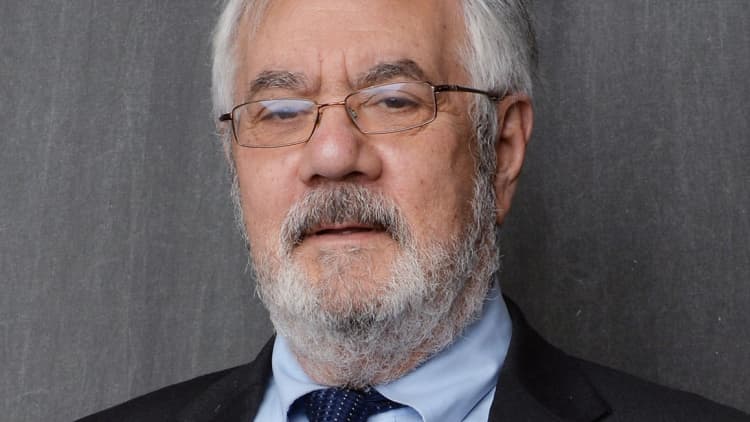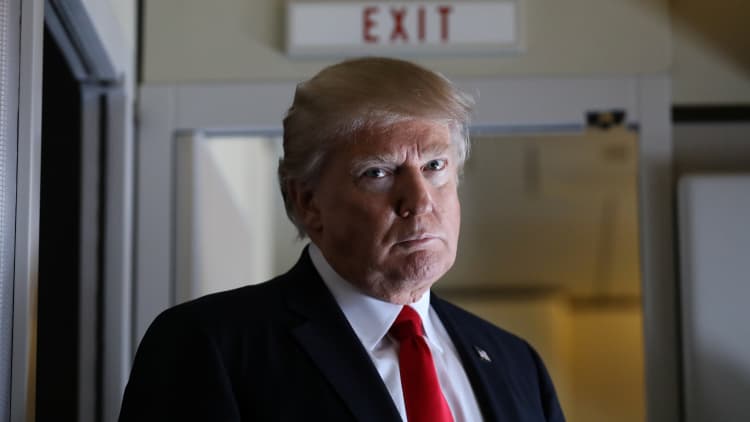
Banking regulations are likely to look a lot different once the Trump administration and Congress get finished rewriting them. The biggest change, though, will come not in legislation but perception.
In signaling an end to the post-financial crisis regulatory landscape, President Donald Trump on Friday sent a message that he was removing the black hats from the heads of Wall Street CEOs.
No profession has been vilified more over the past eight years, whether the hate came from Washington or Hollywood, which busied itself making a flurry of movies showing just how reckless Wall Street behavior was leading up to the crisis.
Now, Trump and the Republican majority are taking bankers out of the penalty box.
"Perhaps the biggest change for all financial services companies and professionals in 2017 is that the political narrative regarding financial regulation has shifted from a punitive focus with anti-business effects to a more traditionally conservative agenda focused on growth and jobs," Christopher Whalen, senior managing director at Kroll Bond Rating Agency, said in a report for clients.
The center of attention for those looking to roll back bank regulations is the Dodd-Frank reforms, passed after the crisis to avoid a repeat of the too-big-to-fail climate that required trillions in government bailouts. While the law helped restore bank capital levels, critics say it also inhibited bank lending and contributed to the meager economic gains during the recovery.
The main changes are likely to be in the way financial advisors work with clients, increasing the asset threshold for banks to undergo more intense regulatory scrutiny, and alterations to the Consumer Financial Protection Bureau, a post-crisis oversight body that has been hit with legal challenges over its structure.
But the overriding goal is to make banks a thriving part of the economy again.
"By easing the political headwinds against banks and non-banks alike, the Trump administration can greatly improve liquidity in the financial markets and enhance the opportunities for economic growth," Whalen said.
Liquidity in financial markets is about making sure trades can be completed at market prices. Dodd-Frank critics believe the so-called Volcker RuleRule in particular is inhibiting liquidity, and a recent paper from the Federal Reserve gives credence to that view.
The rule prohibits banks from trading for their own profit, reasoning that conflicts could come into play over positions they hold for clients. However, there's concern that the rule goes too far and provisions should be made so that broker-dealers and bank affiliates should be able to engage in proprietary trading.
Bank stocks rallied Friday as Trump made clear that he wanted changes, though financial shares were off fractionallly Monday. The executive order directs the Treasury Department to review bank regulations and the Labor Department to review the "Fidicuiary Rule," which mandates that advisors act in their clients' best interests. The rule has stirred controversy over its cost and charges that it will limit choice for investors.

Not everyone was on the same page with Trump. Congressional Democrats promised a stiff fight, and advocacy groups railed that the order was taking banking back into the high-risk days before the crisis.
"The economy was wrecked and communities across the country were devastated," during the financial crisis, Phil Angelides, who served as chairman of the Financial Crisis Inquiry Commission, said in a statement. "Big Wall Street banks admitted wrongdoing and paid tens of billions of dollars in fines. And now, with bankers at his side, President Trump begins to rip apart protections put in place to protect America's families and our economy. Insane."
But Whalen believes the cause of the crisis is painted with too wide a brush and that it was a lack of liquidity rather than capital that served as the major catalyst.
"Since 2008, regulators and policymakers have focused on increased capital for banks and restrictions on risk taking as a general panacea for preventing a future crisis," he said. "In general, KBRA believes that modifications to the Dodd-Frank law that lessen the regulatory burden but address the underlying causes of the crisis will be positive for investors."


